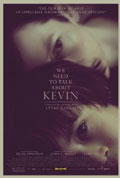
Directed by
Lynne Ramsay
112 minutes
Rated MA
Reviewed by
Sharon Hurst

We Need To Talk About Kevin
Synopsis: What happens when a mother has a child she does not like and that child grows up to detest her, causing her grief at every turn? This is the scenario experienced by Eva (Tilda Swinton), her husband Franklin (John C Reilly), and their first-born, Kevin (Ezra Miller). When the child reaches his mid-teens he does something so horrific one can only ask the question: was he born bad, or did the parents contribute to what happened?
Based upon a prize-winning novel by Lionel Shriver (real name Margaret Ann Shriver), Lynne Ramsay’s film is chillingly mesmerising.
It’s pretty evident from the start that Eva is a reluctant mother, although her second child, Celia (Ashley Gerasimovich), seems to bring her some joy. With her constantly screaming, never sleeping first-born, Eva returns her endless frustration to the child and is emotionally cold. As Kevin, grows he truly seems to have a perverse nature, all-knowing at how he can get to his mother, implacably unaffectionate, resisting toilet training, outstaring her with almost malevolent big brown eyes. Three actors play Kevin, and it is to director Ramsay’s great credit that she gets an amazing performance out of the two littlies who play toddler Kevin and 6-8 yr old Kevin. Ezra Miller’s performance as the teenage Kevin is stunning.
Stylistically this film is something out of the usual mold. The opening scene of the tomato-fest in Europe, at which Eva (once a lauded travel writer, now no doubt resenting the constraints of motherhood) luxuriated in hedonistic abandon is like a dual-edged sword – the pulp looks alarmingly like blood, and the scene foreshadows the dramatic use of the colour red throughout many other scenes. Other early vignettes capture the confusion and memories in Eva’s head – we see disjointed snatches of her life, and the time frame chops back and forth between the present, as she visits a young man in jail, the distant past and her trials in bringing up young Kevin, along with many other scenes that initially make no sense: a woman slaps her, workmates say horrid things to her, her house and car are vandalised with red paint. Many of the frames are long lingering shots of seemingly unrelated things, yet they all help to build a threatening sense of near-paranoia, all enhanced by Swinton’s movingly realistic portrayal of the stricken mother. As an audience we are tantalised and challenged to put the pieces of the puzzle together, the disparate segments building to a whole and a shocked understanding of what really happened.
Ramsay is cleverly careful with her characters never complacently giving us a simply black and white view of who is “good” and who “bad”. Just enough happens to make us question to what extent the parents contributed to Kevin’s psychological aberrations, and yet there is also the constant niggling feel that this child could be just “rotten to the core”.

Want more about this film?


Want something different?




